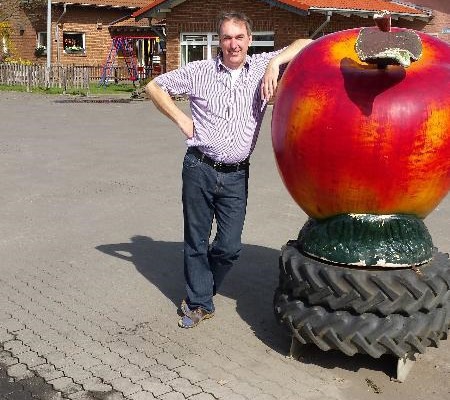The harvest being undertaken by the Rhenish apple growers is in its final stages, says Georg Boekels, chairman of the Landesfachgruppe Obstbau and vice president of the Provinzialverband Rheinischer Obst- und Gemüsebauer e.V.
"At some individual farms, the harvest was not particularly abundant due to the drought. However, the majority of farms were able to harvest a large crops, with quality produce," Boekels said. "There are sufficient volumes available."

Georg Boekels
Large harvest, great quality
Although there definitely were some problems here and there, some things could be corrected thanks to manual labor. "The drought did make for smaller sized fruit. However, due to the rains that started in August, better sized fruit has returned. All in all, my colleagues told me that a large harvest of great quality was achieved, which can be placed on the market accordingly," Boekels says confidently.
Interest in snack apple cultivation rather restrained
"Snack apples are a hot topic," Boekels knows. "There are many promotions going on, particularly for the Rockit brand. However, it must be said that sometimes the trade has not properly factored in everything. Farmers cannot always offer sufficient volumes of the appropriate, smaller sizes. This is of course related to the fact that we as growers always have to contend with Mother Nature. Since the trade is not always able to absorb somewhat larger calibers, this can quickly turn Rockits into 'just a red apple', which in turn is marketed for less money. That doesn't reflect well on this market segment, which is why many farmers are not really interested in getting more involved in this area."
The situation is similar with organic products, he says: "If the organic share is to be changed, this can only be done through the consumer. After all, we producers only produce what consumers will buy. If one would more or less force producers to grow more organic goods, without there being a market for them, this would lead to many angry growers."
Boekels on the "Fliesteden fruit farm"
For many years, Boekels himself has been a fruit producer in Bergheim. "We sell our produce at last year's price levels. However, we had already adjusted the prices last year -to a reasonable extent- to the market situation, so we were not yet exposed to this year's market stresses." He added that his company has already been purchasing renewable electricity for some time.
"Production, packaging materials and fuel costs are not too noticeable yet, because so far there were still enough goods in our storages. However, we will soon have to buy new production goods again. If there is not enough money coming in, one may not have enough funds to focus on new varieties and the like. After all, we need to make a profit to ensure this can be done. You have to remember that a farm is basically a million-dollar asset. An orchard of one hectare costs between 40,000 to 60,000 euros. Extrapolate that to 20 hectares, and you get quite a large sum. On top of that, however, there are (cold) storage facilities, tractors, other machinery, etc. Luckily, we do have some leeway as far as prices are concerned. What will definitely be felt are the 20-25 percent labor cost increases, coupled with the shortage of labor that still persists."
Huge supply of Wetteräpfeln
"Retailers are currently running a huge supply of Wetteräpfeln [apples that have suffered from extreme weather conditions]," Boekels says. "However, these apples are being sold well below cost price. If the plants have been standing longer and farmers have not been able to generate enough money for new plants, there is more effort involved in pruning and with thinning. Moreover, the fruit health of old plants is always worse than that of new plants. That's why it's important to include not only labor and general costs, but to also make sure that we get our reimbursed for our investments and the depreciation. All of this has to be factored into the price as well. If a grower just gets 0.35 euros per kilo, that will not be enough."
For more information: Georg Boekels
Georg Boekels
Provinzialverband Rheinischer Obst- und Gemüsebauer e.V.
Rochusstraße 18
53123 Bonn
Tel. 0228 - 52 006 700
Fax 0228 - 52 006 742
E-Mail: info@provinzialverband.de
Internet: http://provinzialverband.de
